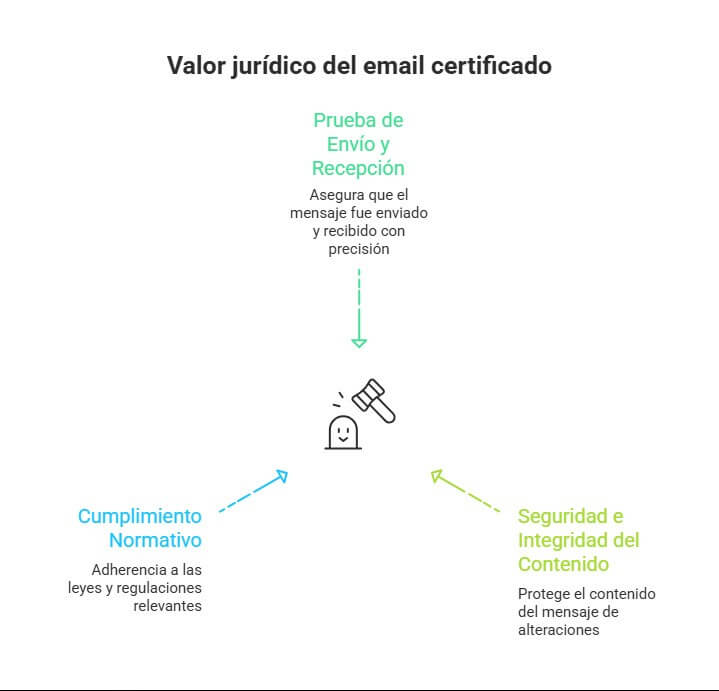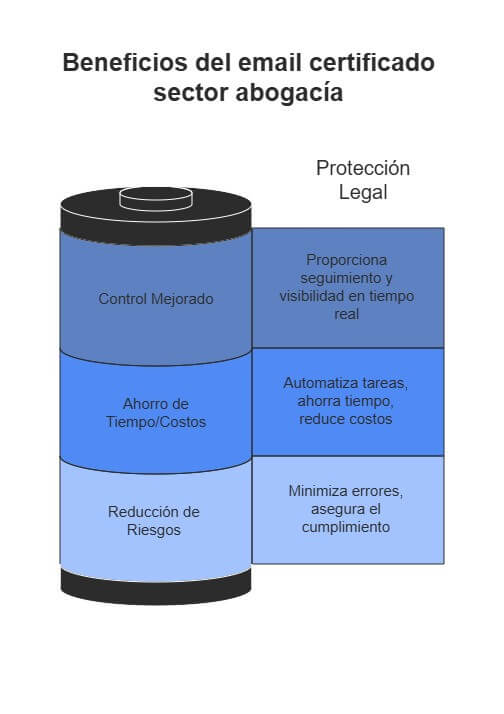Law firms and other legal professionals are most interested in ensuring the legal and evidentiary validity of their communications. In addition, their activity demands maximum security and confidentiality in the exchange of documentation. With certified email, not only do they meet all these needs, but they also gain in ease of use, immediacy and cost reduction.
What do we develop next? This is the outline of the content
- The requirements that give maximum legal validity to a certified email: guarantee of the sending and receiving data, integrity of the content and compliance with current regulations.
- Benefits of certified e-mails for law firms.
- How is the process of implementing certified messaging in a law firm?
What is the legal value of certified email?
Certified digital e-mails have legal validity and can be presented as reliable evidence in legal proceedings, claims or conflicts of interest between parties. The recognition of the legal value of electronic communications is explicitly included in the Civil Procedure Law, after the amendment of its article 229.2.
It is true that, if we talk about full evidentiary capacity, there are differences between the online postal bureaufax and the certified email. However, a similar effectiveness can be achieved if some added services are incorporated during the process of sending the certified email. To clarify doubts, nothing easier than to review the key points of this messaging system.
Do you need more information about this digital tool? This is how our certified email service works.
Proof of shipment and receipt
Undoubtedly, in order for a message to be presented as legal evidence, the veracity of the sending data must be guaranteed. This is an essential requirement. Certified mail does this:
- Record date and time of shipment.
- Identification of the sender and receiver. If you want the maximum rigor, we advise you to add the certified digital identification of both participants.
Content security and integrity
Certified electronic messages ratify that a document has been sent, if the receiver attaches one to the message. By including the electronic signature, you ensure the authentication and integrity of the content, thanks to its cryptographic mechanism.
And you can go one step further by incorporating the acknowledgement to confirm that the message has arrived and has been read.
Let’s go into detail about the evidentiary validity of a certified email in a lawsuit for any company!
Compliance and applicable regulations
None of the above is of any value if these digital communications do not comply with current regulations. The eIDAS 2 regulation has been a breakthrough in the EU regarding digital identity. The trusted service provider, provider of the platform for sending certified communications, must comply with all the requirements of this legal framework and the Data Protection Act.

Otherwise, your emails lose their legal validity! And they are not few, as we review below.
Certified email applications in the legal sector
This type of electronic communication has the same legal validity as a traditional paper document that has been signed by hand. Therefore, a company in the field of law can use this system for sending all its messages.
- Judicial notifications
The exchange of communications with public administrations is fully valid when done through a certified email. - Sending legal documents and contracts
Clauses can be added, conditions can be modified, contracts can be signed or cancelled by certified mail linked to electronic signature processes. In fact, due to its speed, it is increasingly used in labor and financial matters. - Claims and lawsuit management
One of the tasks in the legal sector that has benefited the most from electronic messaging is everything related to the filing of lawsuits or claims.The simplicity of the system, without losing credible value, explains this expansion. In addition, its immediacy is key to avoid losing options due to a matter of documentation submission dates, which are sometimes very limited and short.
Benefits of using certified email for lawyers and law firms
In addition to the general advantages of adopting this digital document delivery system, in the case of the legal sector, its professionals can add these specific benefits.
- Reduced legal risks
Whenever you simplify a process, you reduce the risk of making mistakes. And the speed of delivery makes it easier to avoid problems with meeting deadlines in any claim or legal dispute. - Saving time and operating costs
Law firms handle a large number of documents that are exchanged with their clients and other parties involved in a dispute or legal process. Sensitive information must be sent securely, but also quickly in order to keep up with legal timescales.The alternative to the certified digital courier is the postal service, which is slower and more complex in its operation (certified photocopies, physical displacements). In addition, its operation is so simple that any person can take care of this procedure. Remember that many of these tasks can also be automated.
- Improved traceability and control of communications
The certified email allows real-time tracking of the sending process from start to finish. More control is impossible!

Not all certification service providers are the same! We remind you what a qualified provider is and the requirements to receive this recognition. Contract only with professionals.
How to implement certified email in a law firm
The world of law and the legal profession today is far removed from the immobility with which they are usually associated. Law firms are modern workplaces adapted to the digital universe and the Ministry of Justice is betting more and more on the digitization of procedures to provide a better service to citizens.
Therefore, the implementation of a certified e-mail service does not pose the slightest problem. In any case, we take this opportunity to remind you of the simplicity of this process.
Of course, the key is to choose a platform from a reliable and qualified provider. From here, the process is summarized in 6 very simple steps:
- Access the platform.
- Message composition, as it is done with any email.
- Attach relevant documents, if applicable.
- Enter the receiver’s address and data.
- Before sending, select the option to certify. At this point, you can add other services such as acknowledgement of receipt or electronic signature.
- Send the message, at which time the provider generates a proof of sending.
Undoubtedly, you have seen the importance of having certified emails in your law firm. At MailComms Group we offer you a comprehensive and omnichannel communication service that solves all your communication needs,contact us and receive personalized attention!
Frequently asked questions about certified email in the legal sector
Does certified email have legal value in legal proceedings?
Yes, following the amendment of Article 299.2 of the Civil Procedure Law , the evidentiary value of electronic documents is recognized.
Certified email falls into this category as long as an approved provider is used to guarantee the reliability of the data. If you want to reinforce this probative validity, it is advisable to incorporate the electronic signature.
In which cases is it advisable to use certified email in a law firm?
It is a particularly suitable solution in labor matters. Also, as evidence in contractual disputes and financial claims.
What is the difference between certified email and other methods such as postal bureaufax?
Undoubtedly, the bureaufax is the means that guarantees a greater probative validity, since the content and all the delivery data are accredited, as it includes acknowledgement of receipt and signature.
Certified email can achieve a similar level of proof by ensuring traceability and receipt. However, it does not always guarantee the identity of the recipient.
In general, any certified communication (WhatsApp, SMS) is legally valid as long as there is a qualified certification service provider behind it.
What technical requirements must a certified email provider meet to be reliable?
Imagine the trusted service provider who manages the platform for sending certified communications as if he were a notary. You would not think of using a professional who does not prove his qualifications and training!
Now, let’s transfer this idea to the reliability of the electronic certification service provider. It can only be considered qualified after passing a rigorous audit conducted by the Ministry of Digital Transformation, which verifies that it meets all the technical and organizational obligations set out in eIDAS 2.
